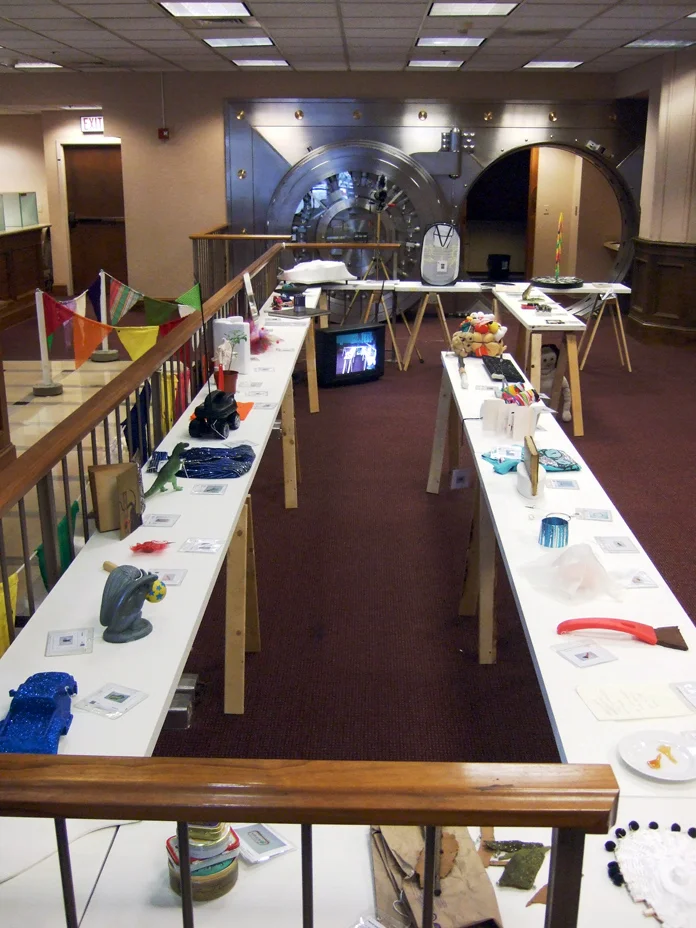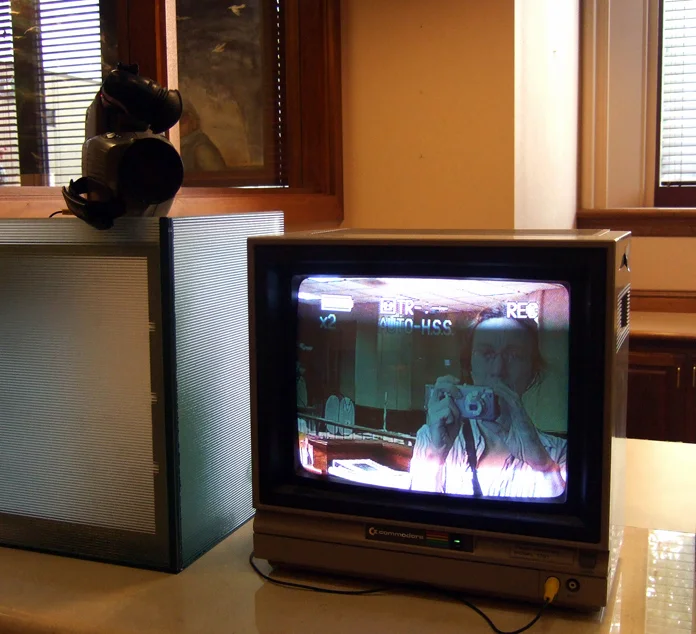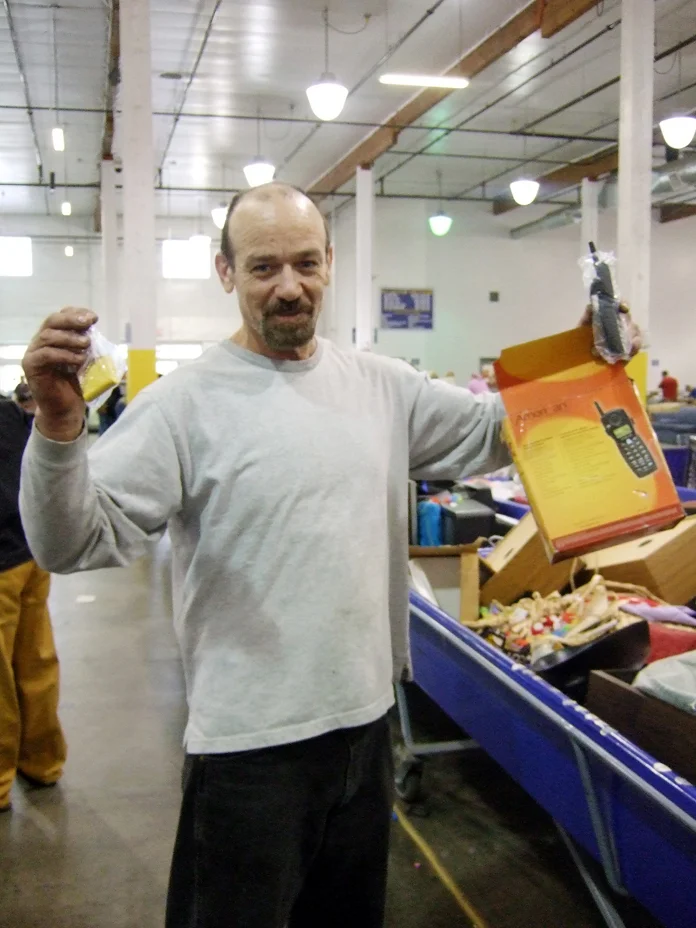
Bins Collaborative
Rachel Hibbard, Sean Regan, Cara Tomlinson
The Bins (aka the Goodwill Outlet Store in Portland, Ore.) is a sorting station that transfers goods from one state to another, from one owner to another, and from one purpose to another. It is the final stop before landfill, materials salvage or last-chance purchase. This installation was one of several projects looking at this redistribution and disposal of consumer goods.
As if you are in a casino time in the Bins seems to continually renew itself: there is always the next bin, the next mass of objects, the next jackpot — each with thing carrying its own history. Stuff is in the process of transforming from useful to trash, from new to obsolete, or from trash to re-useful. The Bins are a reckoning; the skeletons of consumption are accumulating. In this one outlet store alone, 80,000 lbs. of material pass through each day.
We have been regular customers of the Bins for over 15 years. The space brings together America’s vast consumer economy of excess with the tradition of frugality in a startling mix. Oregon’s Immigrant population, Portland natives, micro businesses, obsessive collectors, people who have made the choice to live lower down on the consumer chain, and those who just need inexpensive stuff all churn the same heaps side by side. The abundance of resources grows community just as nutrient soil enriches plant life: the Bins creates unusual economies and social networks, mirroring the processes of bio-systems.
In this second incarnation we use five monitors around the space that highlight the processing of the mass of objects as well as many material aspects of the Bins: the back-room recycling and salvage operation, and the confrontation with the overwhelming abundance and variety of the things in the bins themselves. All materials used in the installation are borrowed from the Bins and will be returned to the cycle after the installation is over.
The greater its height grows, the more the danger of a landslide looms: a tin can, an old tire, an unraveled wine flask, if it rolls toward Leonia, is enough to bring with it an avalanche of unmated shoes, calendars of bygone years, withered flowers, submerging the city in its own past, which it had tried in vain to reject, mingling with the past of the neighboring cities, finally clean. A cataclysm will flatten the sordid mountain range, canceling every trace of the metropolis always dressed in new clothes. In the nearby cities they are all ready, waiting with bulldozers to flatten the terrain, to push into the new territory, expand, and drive the new street cleaners still farther out.
Excerpt: Italo Calvino, “Leonia,” Invisible Cities, 1970.

Things Never Die, Portland Building
Installation: found furniture, clothing, household goods and children’s toys, aprx. 1,500 lbs.
Video: digital video
A three-year exploration of the Bins (a Goodwill outlet store where goods are sold by the pound), its community and “trickle-down” economies. This project grew out of more than a decade of shopping experiences fellow artists Sean Regan, Cara Tomlinson and I have had at this storied Portland institution.
Featuring sculptural installations and videos with over 60 interviews. 2006-09

Bin Labs, collaborative
Preview, of 2 longer videos documenting the “Bins"

Back end of the Bins
Baled clothes are sold to brokers for sale abroad as clothing or as fiber (bales of soft toys are sold in Eastern Europe)

Added Value

Added Value

Added Value

Added Value

Second Growth, detail

Collecting the collecting
digital photograph

Collecting the collecting
Bins being rolled out as people wait to get first pick of the goods

Collecting the collecting

Collecting the collecting

Collecting the collecting

Family being interviewed at the Bins

Collecting the collecting
Bins Collaborative
Rachel Hibbard, Sean Regan, Cara Tomlinson
The Bins (aka the Goodwill Outlet Store in Portland, Ore.) is a sorting station that transfers goods from one state to another, from one owner to another, and from one purpose to another. It is the final stop before landfill, materials salvage or last-chance purchase. This installation was one of several projects looking at this redistribution and disposal of consumer goods.
As if you are in a casino time in the Bins seems to continually renew itself: there is always the next bin, the next mass of objects, the next jackpot — each with thing carrying its own history. Stuff is in the process of transforming from useful to trash, from new to obsolete, or from trash to re-useful. The Bins are a reckoning; the skeletons of consumption are accumulating. In this one outlet store alone, 80,000 lbs. of material pass through each day.
We have been regular customers of the Bins for over 15 years. The space brings together America’s vast consumer economy of excess with the tradition of frugality in a startling mix. Oregon’s Immigrant population, Portland natives, micro businesses, obsessive collectors, people who have made the choice to live lower down on the consumer chain, and those who just need inexpensive stuff all churn the same heaps side by side. The abundance of resources grows community just as nutrient soil enriches plant life: the Bins creates unusual economies and social networks, mirroring the processes of bio-systems.
In this second incarnation we use five monitors around the space that highlight the processing of the mass of objects as well as many material aspects of the Bins: the back-room recycling and salvage operation, and the confrontation with the overwhelming abundance and variety of the things in the bins themselves. All materials used in the installation are borrowed from the Bins and will be returned to the cycle after the installation is over.
The greater its height grows, the more the danger of a landslide looms: a tin can, an old tire, an unraveled wine flask, if it rolls toward Leonia, is enough to bring with it an avalanche of unmated shoes, calendars of bygone years, withered flowers, submerging the city in its own past, which it had tried in vain to reject, mingling with the past of the neighboring cities, finally clean. A cataclysm will flatten the sordid mountain range, canceling every trace of the metropolis always dressed in new clothes. In the nearby cities they are all ready, waiting with bulldozers to flatten the terrain, to push into the new territory, expand, and drive the new street cleaners still farther out.
Excerpt: Italo Calvino, “Leonia,” Invisible Cities, 1970.
Things Never Die, Portland Building
Installation: found furniture, clothing, household goods and children’s toys, aprx. 1,500 lbs.
Video: digital video
A three-year exploration of the Bins (a Goodwill outlet store where goods are sold by the pound), its community and “trickle-down” economies. This project grew out of more than a decade of shopping experiences fellow artists Sean Regan, Cara Tomlinson and I have had at this storied Portland institution.
Featuring sculptural installations and videos with over 60 interviews. 2006-09
Bin Labs, collaborative
Preview, of 2 longer videos documenting the “Bins"
Back end of the Bins
Baled clothes are sold to brokers for sale abroad as clothing or as fiber (bales of soft toys are sold in Eastern Europe)
Added Value
Added Value
Added Value
Added Value
Second Growth, detail
Collecting the collecting
digital photograph
Collecting the collecting
Bins being rolled out as people wait to get first pick of the goods
Collecting the collecting
Collecting the collecting
Collecting the collecting
Family being interviewed at the Bins
Collecting the collecting
















